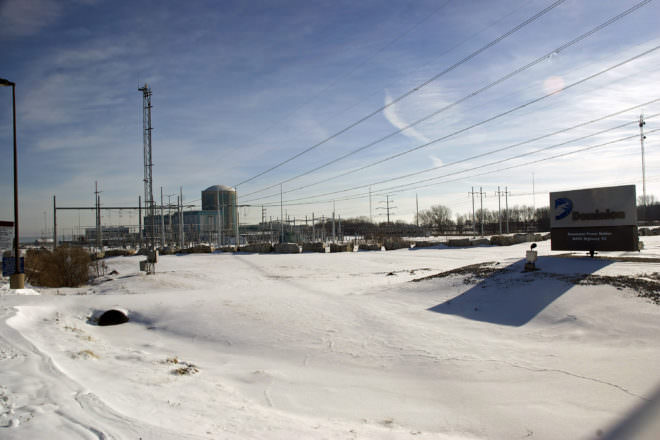Town of Carlton Reaches Settlement Over Closed Nuke Plant Taxes
- Share
- Tweet
- Pin
- Share

The air inside Carlton’s town hall almost crackled with excitement last Saturday morning for the specially called town meeting to vote on a settlement agreement reached with Dominion Resources of Richmond, Va., a company commonly referred to as an “energy giant.”
In comparison, Carlton is a rural community of about 1,000 people in southeastern Kewaunee County, so this was an actual David and Goliath legal matchup.
What is particularly remarkable, is that besides its own hired legal help, the town did this on its own, without assistance from the other taxing entities or elected officials.
In fact, a town resident asked the board at the meeting if they had any help from elected officials. Town Chair David Hardtke answered.
“[Sen.] Frank Lasee, I was really surprised that anybody put a sign up for him in this town because Frank Lasee did absolutely nothing for us,” Hardtke said. “In fact he called this town board of hardworking people a bunch of bumbling idiots. And what we did, we followed the law. I had a conversation with him. He didn’t like it. He hung up on me.”
In 2005 Dominion bought the then-31-year-old nuclear power plant on 900 acres of lakefront property, and in the fall of 2012 announced it was closing the plant due to purely economic reasons.

Attorney Ben Brantmeier explains to Town of Carlton residents the agreement he reached regarding a property tax dispute with Dominion Energy Kewaunee, Inc., the nuclear plant that shut down in 2012. Photo by Jim Lundstrom.
Besides the more than 600 high-paying jobs that were lost when the nuke plant closed, Carlton and various other taxing entities within Kewaunee County suddenly lost a very fat cash cow.
The town reaped close to a quarter million dollars a year in property taxes from the energy company, even after the plant was closed. Finally, the company said enough and filed suit for reclamation of 2015 and 2016 taxes, claiming the tax value of the property was zero because the company could neither use it nor sell it.
The town assessed the property at $457,398,600 in 2015 and $468,970,500 in 2016. The 2015 tax rate was $13.358034 per $1,000 of assessed value, amounting to a $6,109,719.45 tax bill for Dominion. The tax rate was slightly lower in 2016 – $13.216840 per $1,000 – but the property assessment was slightly higher, so the tax bill was $6,197,303.59. The town’s portion of that 2015 tax bill was $240,051.31, and in 2016 it amounted to $240,094.14. The rest each year went to the other taxing entities – Kewaunee County, Kewaunee School District, Northeast Wisconsin Technical College and the State of Wisconsin.
Dominion filed a lawsuit against the city. The company wanted that money back. The town said no way.
It was obvious at Saturday’s meeting that town residents still feel betrayed by Dominion for shuttering the plant just a year after the Nuclear Regulatory Commission had granted the company a 20-year extension for its operating license – to the year 2033.
Upon receipt of that license, Dominion CEO David A. Christian said in a press release: “We are proud of the employees at Kewaunee and the work they do every day to run the unit safely and reliably. All employees celebrate in the successful conclusion of the NRC’s thorough license renewal process.”
That sounds like everything is hunky dory and the 574-watt plant was set to provide electricity to 140,000 homes well into the future.
Shortly after Dominion’s Oct. 22, 2012, closing announcement, Gov. Scott Walker took the opportunity to hammer on a favorite theme of his party: “The proposed closing at the Kewaunee Power Station highlights the need to decrease unnecessary federal regulations slowing the process for companies, like Dominion, to take advantage of economies of scale and keep their businesses profitable and open.”
The company denied federal regulations were shutting them down, and pointed instead at low natural gas prices and the abundance of natural gas with the recent frantic fracking activity around the country.
Dominion filed suit against the town in August 2015, claiming the five parcels – about 200 acres within the total 900 acres – that the plant actually sits on are worth nothing, rather than the nearly half-million dollar assessment the town had come up with.
The town board started doing their homework and they hired an attorney, and then another one, and another, and finally, hired their fourth attorney, Ben Brantmeier, last year after a court date had already been set for this month before Door County Judge D. Todd Ehlers.
“He did more for this town in the last four or five months than all the other attorneys together,” Hardtke said in introducing Brantmeier at the meeting.
Brantmeier spent the first hour of Saturday’s town board meeting explaining the history and components of the settlement agreement. He made an argument for having discovered some precedent and possessing the hometown advantage where they might have held some sway in court, but even then there certainly would be an appeal, and then the town would be endlessly mired in this spongy legal dispute.
Also, everyone involved could feel the eyes of the energy industry and other threatened communities on this case.
“If you look at what they’re offering us, we’re probably doing better than if we went to court,” Hardtke said after Brantmeier’s presentation.
The offer was that the town would not have to refund any of its tax collections to Dominion, but the other taxing entities in the county would have to refund their portions, which amounts to $11,908,407. Brantmeier said they will be working with the state Department of Revenue so the entities could refund the taxes in a 10-year-period.
The agreement places the property value of the disputed parcels at $15,000,000, and Dominion agreed to make a “supplemental payment” to the town for the term of the agreement, which Brantmeier said is eight years.
The agreement also stipulated that town Clerk Linda Sinkula, who also serves as a Kewaunee County Board of Supervisors, must recuse herself from any county discussions on this agreement or litigation.
The burden of returning those taxes now falls on the other taxing entities, including the Kewaunee School District. Asked what kind of burden this will place on the district, Kewaunee School District Superintendent Karen Treml said, “Given the uniqueness of this situation, we are working with our financial consultants to determine our best course of action.”



